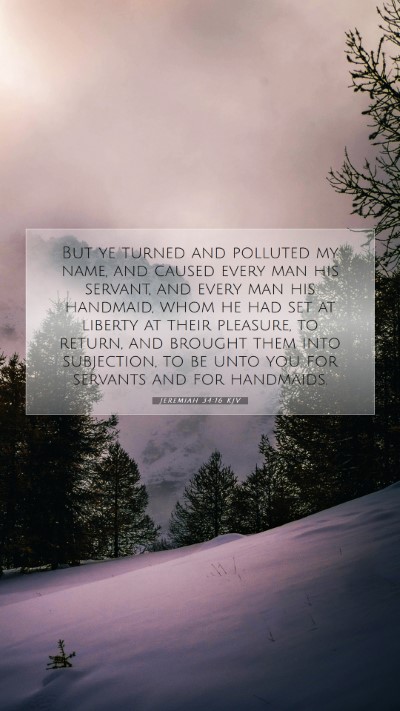Understanding Jeremiah 34:16
Jeremiah 34:16 reads: "But you turned and profaned my name, and every one of you took back his male and female slaves, whom you had set at liberty at their pleasure, and brought them into subjection to be your male and female slaves." This verse reflects a significant moment in the history of Israel and serves as a grave warning about the dishonor of God's name and the consequences of disobedience.
Contextual Overview
The background of this verse is essential for understanding its meaning. Historically, God's people were in covenant relationship with Him, agreeing to release their Hebrew slaves in the seventh year, as the Law dictated. However, upon experiencing fear of Babylonian conquest, the leaders of Israel chose to disregard this Divine mandate and went back on their word.
Meaning of the Verse
The essence of Jeremiah 34:16 can be dissected into several key components:
- Profaning God's Name: By disregarding their covenant agreements, the Israelites tarnished God's reputation. They knew that obedience was tied to their identity as God's people.
- Returning to Oppression: This act of enslaving those whom they had just freed represents a severe moral failure and highlights the tendency of humanity to revert to familiar sinful behaviors.
- Divine Displeasure: God's reaction to their actions indicates the serious consequences of betrayal against His commands, linking this disobedience to a broader narrative of covenant faithfulness.
Biblical Commentary Insights
Insights from renowned biblical commentaries provide clarity:
- Matthew Henry: Henry emphasizes the spiritual implications of this verse, highlighting the contrast between liberty and servitude in relation to obedience to God. He notes that their actions showed a lack of faith and a disregard for God’s laws.
- Albert Barnes: Barnes focuses on the historical context, explaining that the decision to re-enslave freed individuals came from a fear of external threats. He articulates that this verse presents an unmasking of Israel’s true intentions and a warning of impending divine judgment.
- Adam Clarke: Clarke elaborates on the nature of promises made and broken, illustrating how the commitment to God’s law was compromised by social and economic pressures. He stresses the significance of keeping vows made to God and the dire repercussions that follow disobedience.
Theological Implications
Jeremiah 34:16 serves as a profound reflection of critical theological themes:
- Covenant Relationship: The passage underscores the importance of maintaining a covenant with God, illustrating how quickly human intentions can shift from faithfulness to betrayal.
- Moral Accountability: The re-enslavement of freed individuals raises questions about moral accountability and the responsibilities inherent in relationships, both divine and social.
- God’s Justice: This verse speaks to God's justice, serving as an admonition that moral decay leads to consequences, both personally and nationally.
Application for Today
For modern believers, the implications of this verse are significant:
- Keeping Promises: The importance of integrity and honoring commitments, especially those made before God, is paramount in spiritual and everyday life.
- Social Justice: Understanding our responsibilities toward others, particularly the marginalized, echoes the essence of caring for the oppressed.
- Faith and Fear: This passage encourages believers to trust in God’s promises rather than succumbing to fear that leads to unethical decisions.
Related Cross References
- Exodus 21:2: Discusses the laws surrounding Hebrew servitude and the command to free slaves in the seventh year.
- Leviticus 25:10: The year of Jubilee and the principles of freedom and restoration in the community.
- Matthew 5:37: Jesus teaches about the importance of letting one's yes be yes and no be no, emphasizing the gravity of one's word.
Conclusion
Jeremiah 34:16 encapsulates profound themes about the nature of promises, the weight of disobedience, and the character of God in the face of human failure. As believers engage with this scripture, they are encouraged not only to seek deeper Bible verse meanings and Bible verse interpretations but also to reflect on its message regarding personal integrity and communal responsibility.


